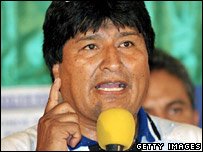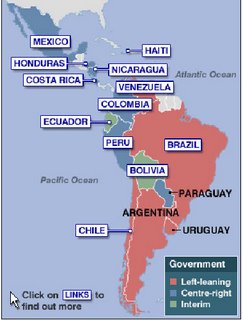“I am not a drug trafficker….I am a coca grower. I cultivate coca leaf, which is a natural product. I do not refine [it into] cocaine, and neither cocaine nor drugs have ever been part of the Andean culture.” [Bolivian President-Elect Evo Morales]
 This quote alone should explain why so many poor, indigenous and politically marginalised South American farmers have heralded the rise to power of native son Evo Morales. Beyond supporting the cultivation of their cash crop, however, President-Elect Morales has vowed to emulate his political mentor Venezuelan President Hugo Chavez by not only nationalizing Bolivia’s petroleum industry but also extracting a more equitable share of oil profits to redistribute amongst poor Indians whose ancestral lands have been “exploited by American imperialists.”
This quote alone should explain why so many poor, indigenous and politically marginalised South American farmers have heralded the rise to power of native son Evo Morales. Beyond supporting the cultivation of their cash crop, however, President-Elect Morales has vowed to emulate his political mentor Venezuelan President Hugo Chavez by not only nationalizing Bolivia’s petroleum industry but also extracting a more equitable share of oil profits to redistribute amongst poor Indians whose ancestral lands have been “exploited by American imperialists.”
Viva Morales!
But the real story of his election is what it signifies and portends for the political landscape in the Americas. Because, as President Bush was on television last Sunday night pleading with fellow Americans to have faith in his crusade to spread democracy throughout the Middle East, President Chavez was on television welcoming Bolivians as the latest converts in his crusade to spread socialism throughout Latin America.
Indeed, it is a remarkable and ironical fact that in the geopolitical chess game between these adversarial political ideologies, the socialism Chavez champions has captured more pawns. After all, since 9/11 – the precipitating event for Bush’s democracy crusade – the overwhelming majority of governments elected throughout the Americas (including Uruguay last March and Chile just weeks ago) have pledged solidarity with Chavez and vowed to implement his socialist agenda.
 Moreover, this map highlights “Latin America’s year of elections [2006]” during which this left-leaning trend is likely to be reinforced by the democratic election (or reelection) of Chavez-style leaders in most countries – despite (or perhaps to spite) Bush’s push for American-style democracies. And, given the restive spirit amongst the indigenous people of Ecuador, it would not be at all surprising to see a native son assume the presidency in that country as well.
Moreover, this map highlights “Latin America’s year of elections [2006]” during which this left-leaning trend is likely to be reinforced by the democratic election (or reelection) of Chavez-style leaders in most countries – despite (or perhaps to spite) Bush’s push for American-style democracies. And, given the restive spirit amongst the indigenous people of Ecuador, it would not be at all surprising to see a native son assume the presidency in that country as well.
Alas, it may be that the Bush Administration can only concentrate on one insurgency at a time. But this socialist insurgency clearly reflects America’s shrinking sphere of influence throughout the Americas. And, it portends even more dire consequences for the American way of life than the pestering distraction of Islamic Jihadists. (Are you aware that America imports more oil from Latin America [Mexico and Venezuela] than it does from the Middle East?)
Note: I respect Morales for defending the national and natural right of indigenous Bolivians to cultivate coca. And I think he’s right to reject the extra-territorial presumptions that have allowed the U.S. Drug Enforcement Agency (DEA) to destroy thousands of hectares of coca harvest in recent years; especially since the Bolivians have other legal and commercially viable uses for their coca leaf (eg. for tea and traditional medicines). Although, ironically, the more hectares the DEA destroys, the more lucrative the crop becomes….
Therefore, instead of trying to wipe out coca farming in South America, the Bush Administration would serve the American people better by trying to wipe out demand for cocaine at home.
Endnote: In the few years since it overthrew the Taliban, the U.S. has given millions to the government of President Hamid Karzai to subsidize a crop substitution program for poor farmers in Afghanistan. Yet, eventhough these farm subsidies were aimed at wiping out the country’s poppy cultivation, the Associated Press reported just last week that:
“…opium production has boomed since the fall of the Taliban, stoking fears that Afghanistan – source of 80 percent of the world’s heroin – is becoming a narco-state.”
In fact, according to U.S. Gen. James L. Jones “the number one problem in Afghanistan [is not the Islamic terrorists; instead it] is drugs.”
Nevertheless, given the billions in dubious no-bid contracts the U.S. gave his former company Halliburton, U.S. Vice President Dick Cheney probably thought it prudent not to question Karzai about why the poppy eradication program is yielding such poor value for money during his stealth visit to Afghanistan on Sunday.
News and Politics
Leave a Reply
You must be logged in to post a comment.